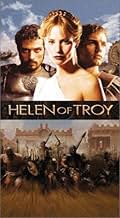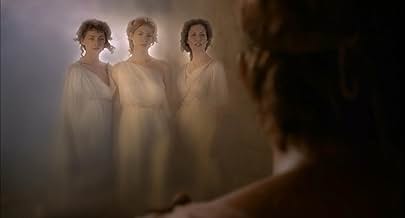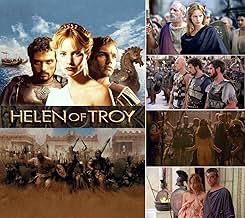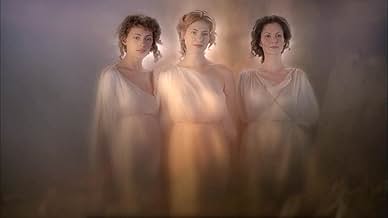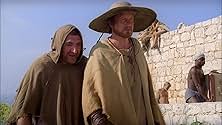IMDb-BEWERTUNG
6,2/10
6933
IHRE BEWERTUNG
Füge eine Handlung in deiner Sprache hinzuThe abduction of beautiful Helen, wife of Spartan King Menelaus, by Paris of Troy triggers a long war.The abduction of beautiful Helen, wife of Spartan King Menelaus, by Paris of Troy triggers a long war.The abduction of beautiful Helen, wife of Spartan King Menelaus, by Paris of Troy triggers a long war.
- Für 1 Primetime Emmy nominiert
- 1 Gewinn & 7 Nominierungen insgesamt
Folgen durchsuchen
Empfohlene Bewertungen
Unlike the epic TROY, which spent much time and money recreating the spectacle of the Trojan War with CGI, the emphasis here is on the political ambitions and prophecies leading up to the start of the siege of Troy. Rufus Sewell as Agamemnon gives a performance (as the man who would conquer Troy) which eerily evokes Oliver Reed at his sinister best, as he makes it clear that the romance of Helen and Paris was merely a convenient excuse for the events that followed, and that the war came out of his own thirst for conquest. Sienna Guillory is attractive as Helen, but her role is rapidly reduced to that of a bystander in the great events that swirled around her. And the film makes clear its logic about this: how could a woman be responsible for a war in a time when even princesses were chattels of the royal houses to be auctioned off in marriage for political gain? As it deals more intimately with its characters and looks more closely at social power structures and gender roles of the period, this film is much more interesting as a human drama than the rather empty spectacle TROY.
I disagree with the reviewer who thinks Paris is prettier than Helen. Sienna Guillory is gorgeous! As in the Iliad Paris & Helen are a matched pair. I also disagree with the reviewer who panned the movie because it was not faithful to the Iliad. No movie, not even a TV miniseries, can be expected to be totally faithful to any book. A movie is always a selection. The question should not be what was omitted, or whether it compressed or altered the text for cinematic purposes. Of course it did! The question is whether or not it captured the spirit of the original, or whether it did violence to that spirit, as too many movies do. In my view this movie captured the spirit of the Iliad surprisingly well. Perhaps the Greek heroes, especially Agamemnon, do not come off as heroically as the modern viewer has come to expect. But then our idea of heroism, (confused as it too often is with idealism), is not Homer's; and, then again, this movies portrayal of the Greeks as devious aggressors plotting the conquest of Troy is both historically accurate and does nothing to distort Homer's portrait of them. He certainly would have agreed. I did feel that the movie became somewhat rushed at the end. Unfortunately, this seems to be a common problem with many movies based on classic works of literature. The director seems to lavish most of his energy and resources on the beginning and middle of the story. Then, as time and money begin to run out, the ending becomes hurried, episodes are combined, the story becomes perilously compressed. But even here, the movie does not really leave the viewer disappointed. The scene in which the Trojan Horse suddenly appears without explanation outside the walls of Troy is particularly effective, because it appears to the viewer just as it must have appeared to the Trojans. Even though one may wish for more, nothing in the movie's ending distorts Homer's tale of the fall of Ilium.
I can't believe that the writers of this miniseries read any of the myths or the Iliad itself. The inconsistencies were truly amazing. But I guess it didn't matter, as the plot seemed to revolve around fighting and nudity. First of all Cassandra could not have told her father to kill the infant Paris; she did not receive her powers until she was a young woman. Apollo wanted her; she said yes and received the gift of prophecy; then, when she refused him, he could not take it back but cursed her that no one would believe her. Helen was not kidnapped by Theseus! Clytemnestra had three children, and Orestes and Elektra helped her wreak her vengeance for the death of Iphigenia. The gods & goddesses took a much more active part in the war, with Aphrodite telling Paris where to shoot Achilles and Athena guiding Odysseus, her favorite. The arrow in the heel meant nothing without the explanation. Agamemnon took Cassandra as part of his spoils. Hector had a wife, Andromache, whom he adored. Where was she? Where was Ajax?This was just too far from canon. One thing I did like was the loving relationship between Clytemnestra and her daughter Iphigenia; it was very understandable why she would kill Agamemnon.
As for the actors, Helen was not that beautiful. It was good to see John Rhys-Davies, but he was too thin and did not look well. Maryam D'Abo was made to look too old--an older actress should have been cast. She's still a Bond girl to me! Achilles was overplayed, and there was no reason for him to be bald. I did like Odysseus, however.
I'm not really sorry I watched it, just a little ashamed of myself for sticking out the whole four hours.
As for the actors, Helen was not that beautiful. It was good to see John Rhys-Davies, but he was too thin and did not look well. Maryam D'Abo was made to look too old--an older actress should have been cast. She's still a Bond girl to me! Achilles was overplayed, and there was no reason for him to be bald. I did like Odysseus, however.
I'm not really sorry I watched it, just a little ashamed of myself for sticking out the whole four hours.
There are many different stories and interpretations of Homer's Iliad, or better known as the 'Trojan War.' 'Helen of Troy' is one movie that showed a different perspective of the events in the leading lady's point of view.
The Iliad written by Homer, from which this film was based on, talks about the 'greatest war story ever told': the infamous 'Trojan War.' This legendary epic began with the elopement of Helen, the fairest woman in the land, and Troy's cursed Prince Paris. Menelaus, her husband, mad with jealousy and broken pride, allied with his brother, Agamemnon, to wage a war against Troy. They put together a great army consisting of the greatest and bravest warriors of their land, Greece. When they arrived at Troy, a dispute rose between Agamemnon and Achilles because of their women prizes, Chryseis and Briseis. This resulted to Achilles' refusal to participate in the war for nine years. During that time, victory for each country wavered as the gods and goddesses in Olympus helped their favorite side. When Achilles decides to fight at last, it is in revenge for his best companion, Patroclus who was killed by Hector. He slew Hector and dragged his body to his camp. Despite Zeus' disagreement, Hector died because he was fated to do so. Odysseus came up with the idea of the Wooden Horse. He planned to get inside the gates of Troy so they could finally attack. The Trojans brought in the horse and when night fell, the Greeks attacked the Trojans, burnt their houses, killed their children and took their women as prizes.
The characters portrayed in the movie were fashioned in such a way that they appeared to be real and complex human beings. They gave in to their desires and to their human weaknesses such as pride, jealousy and anger but they also fought for justice, honor and love. Therefore you can easily sympathize and understand their actions and decisions since we all have the same human flaws and experiences. Most of the characters in 'Helen of Troy' were very much true to the original text in the Iliad. However, some key roles were fabricated to make the audience sympathize and admire characters like Paris, Helen and Menelaus as opposed to their selfish and arrogant personalities in the Iliad. They acted very well and very convincing such that they become distinct from the other characters in the story. Each person was unique to the other.
The script of the movie was true to the text to some extent. The beginning of 'Helen of Troy' started with the judgment of Paris in Mount Ida, which first introduced the prince to Helen. He was banished from Troy to the mountain as an infant because of Cassandra's prophecy that he will cause the end of their country. He finds out that he is a prince of Troy when he defeats Hector in a game and is finally accepted into the family despite his sister's constant protests. During her sister's wedding, Helen was abducted by Theseus and was brought to his country. They stayed together for a few years and Helen started falling in love with him until Pollux came to save her and was killed in the process. Theseus also died and Helen was brought back to Sparta where her father, Tyndareus, gave her away to the soldiers. The soldiers couldn't deny her beauty but decided to choose the husband by tossing rings. The one closest to the jar was Menelaus' and therefore, they married. Once, Paris went to Sparta to make peace with the city but when he sees Helen, they fall in love. They elope and when Menelaus found out about this, he associated with his brother, Agamemnon. Upon Reaching Troy, Menelaus first decides to talk to Priam, the country's king. Priam refuses to give Helen back and that's where the war began.
Overall, the movie, 'Helen of Troy', has been loyal to the original text in the Iliad except in some aspects. They both portray roughly the same roles and personalities of the characters. Although love was not a plausible theme in Homer's text as shown in the movie and the gods' influencing the waves of war weren't concretely depicted in the film, other themes like pride and honor coincided in both. The changes in the script didn't ruin the outcome of the movie. They just served as a form of exaggeration to further establish the uniqueness of the characters. The Iliad is classic, and it should be remembered this way.
The Iliad written by Homer, from which this film was based on, talks about the 'greatest war story ever told': the infamous 'Trojan War.' This legendary epic began with the elopement of Helen, the fairest woman in the land, and Troy's cursed Prince Paris. Menelaus, her husband, mad with jealousy and broken pride, allied with his brother, Agamemnon, to wage a war against Troy. They put together a great army consisting of the greatest and bravest warriors of their land, Greece. When they arrived at Troy, a dispute rose between Agamemnon and Achilles because of their women prizes, Chryseis and Briseis. This resulted to Achilles' refusal to participate in the war for nine years. During that time, victory for each country wavered as the gods and goddesses in Olympus helped their favorite side. When Achilles decides to fight at last, it is in revenge for his best companion, Patroclus who was killed by Hector. He slew Hector and dragged his body to his camp. Despite Zeus' disagreement, Hector died because he was fated to do so. Odysseus came up with the idea of the Wooden Horse. He planned to get inside the gates of Troy so they could finally attack. The Trojans brought in the horse and when night fell, the Greeks attacked the Trojans, burnt their houses, killed their children and took their women as prizes.
The characters portrayed in the movie were fashioned in such a way that they appeared to be real and complex human beings. They gave in to their desires and to their human weaknesses such as pride, jealousy and anger but they also fought for justice, honor and love. Therefore you can easily sympathize and understand their actions and decisions since we all have the same human flaws and experiences. Most of the characters in 'Helen of Troy' were very much true to the original text in the Iliad. However, some key roles were fabricated to make the audience sympathize and admire characters like Paris, Helen and Menelaus as opposed to their selfish and arrogant personalities in the Iliad. They acted very well and very convincing such that they become distinct from the other characters in the story. Each person was unique to the other.
The script of the movie was true to the text to some extent. The beginning of 'Helen of Troy' started with the judgment of Paris in Mount Ida, which first introduced the prince to Helen. He was banished from Troy to the mountain as an infant because of Cassandra's prophecy that he will cause the end of their country. He finds out that he is a prince of Troy when he defeats Hector in a game and is finally accepted into the family despite his sister's constant protests. During her sister's wedding, Helen was abducted by Theseus and was brought to his country. They stayed together for a few years and Helen started falling in love with him until Pollux came to save her and was killed in the process. Theseus also died and Helen was brought back to Sparta where her father, Tyndareus, gave her away to the soldiers. The soldiers couldn't deny her beauty but decided to choose the husband by tossing rings. The one closest to the jar was Menelaus' and therefore, they married. Once, Paris went to Sparta to make peace with the city but when he sees Helen, they fall in love. They elope and when Menelaus found out about this, he associated with his brother, Agamemnon. Upon Reaching Troy, Menelaus first decides to talk to Priam, the country's king. Priam refuses to give Helen back and that's where the war began.
Overall, the movie, 'Helen of Troy', has been loyal to the original text in the Iliad except in some aspects. They both portray roughly the same roles and personalities of the characters. Although love was not a plausible theme in Homer's text as shown in the movie and the gods' influencing the waves of war weren't concretely depicted in the film, other themes like pride and honor coincided in both. The changes in the script didn't ruin the outcome of the movie. They just served as a form of exaggeration to further establish the uniqueness of the characters. The Iliad is classic, and it should be remembered this way.
There were several images that were important in the movie. Helen really stood out to be the most beautiful woman at that time but there were a lot of differences from the text. In the movie, what she showed the audience was a childish lady who suddenly turns into a flirt. Sometimes, it is also hard to grasp her true emotions probably because this flirt image has enveloped her identity in the movie. What I admired about Paris was not his cute face. It is true that he looks fit for the character of Paris but what's more to that is you could see in his face his passion for whatever he's doing and saying. The image of a "pretty boy" was really fit for him. I am very fascinated with how Agamemnon was able to internalize his character very well. He portrayed a king who was really greedy but also showed a soft side. His facial expressions were also stunning especially his eyes. His portrayal of Agamemnon's character was constant all throughout the movie. Menelaus' identity was hard to depict because his identity in the Iliad was not totally exposed. What was admirable in him in the movie was his being a nice man or prince. I saw in him the change from the beginning of the movie to the end. You could see in him his sincerity in changing. Although Hector only had a small part, he was able to show the audience a noble Trojan. His image in the movie was different from the original text. He was not the strongest Trojan and he was even overpowered by his brother, Paris. Achilles was a totally different character. He was just a war and bloodthirsty warrior in the movie. It's as if he's just a bully in Helen of Troy.
The technical aspects for me were not that good. The voices were hardly audible. Sometimes, it's as if the actors and actresses were just murmuring to each other although the background music was suitable for the movie. It made you imagine what it was like before and how it felt during that time. There were scenes that were too dark that the characters could not be seen anymore but the shade of colors used were suitable for the time being illustrated in the movie. There were angles wherein a character was blocking someone else and it made it so hard to feel and see what's really happening but there were also shots that were nice. This was particular with the wooden horse. The angle of the shot made the wooden horse look so majestic and the audience would really be at awe with how the Greeks were able to come up with that plan and how they were able to make that wooden horse.
Overall, Helen of Troy is something worthwhile to watch not only because of Paris' look but also because the movie gave explanations on how things came to be and it brought its audience closer to the "reality" of the Iliad.
The technical aspects for me were not that good. The voices were hardly audible. Sometimes, it's as if the actors and actresses were just murmuring to each other although the background music was suitable for the movie. It made you imagine what it was like before and how it felt during that time. There were scenes that were too dark that the characters could not be seen anymore but the shade of colors used were suitable for the time being illustrated in the movie. There were angles wherein a character was blocking someone else and it made it so hard to feel and see what's really happening but there were also shots that were nice. This was particular with the wooden horse. The angle of the shot made the wooden horse look so majestic and the audience would really be at awe with how the Greeks were able to come up with that plan and how they were able to make that wooden horse.
Overall, Helen of Troy is something worthwhile to watch not only because of Paris' look but also because the movie gave explanations on how things came to be and it brought its audience closer to the "reality" of the Iliad.
Wusstest du schon
- WissenswertesThis adaptation changes several aspects of the original legend of Helen. The gods play almost no role in the characters' lives, Helen is not shown to have any children and it's not explained how Cassandra supposedly got her powers. Instead, the series plays the story like a brutal historical event with little supernatural elements.
- PatzerIt is mentioned three times that Troy is the gateway to the riches of Byzantium. The city of Byzantium was founded in 667BC five centuries after the Trojan War.
- VerbindungenReferenced in In Praise of Action (2018)
Top-Auswahl
Melde dich zum Bewerten an und greife auf die Watchlist für personalisierte Empfehlungen zu.
- How many seasons does Helen of Troy have?Powered by Alexa
Details
- Erscheinungsdatum
- Herkunftsland
- Offizieller Standort
- Sprache
- Auch bekannt als
- Helen of Troy
- Drehorte
- Produktionsfirmen
- Weitere beteiligte Unternehmen bei IMDbPro anzeigen
- Laufzeit
- 1 Std. 28 Min.(88 min)
- Farbe
- Sound-Mix
- Seitenverhältnis
- 1.78 : 1
Zu dieser Seite beitragen
Bearbeitung vorschlagen oder fehlenden Inhalt hinzufügen


